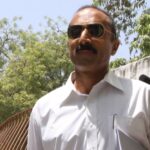In today’s digitally driven world, many are quick to judge others’ personal choices, especially when it comes to religion and expression. Amid this, actor ’s words strike a powerful chord about staying rooted in one’s beliefs while embracing spiritual openness.
In a recent conversation with journalist Shubhankar Mishra, she opened up about navigating faith, identity, and online criticism with unwavering clarity. “Wherever you find peace, whether it’s in a mandir, a gurudwara, or a church, you should go there. I even say this openly: I pray namaz. If I get time, I pray five times a day. I even carry my prayer mat while travelling. Wherever I go, I find the same peace and calm. I’ve always believed there’s one God, and different paths to connect with Him. And I want to explore all those paths,” she said.
Bharuccha then addressed constant trolling online by those who question her choices. “Whether it’s about my clothes or where I go, I’ve faced comments. When I post my picture, people ask, ‘What kind of Muslim is she? Look at her clothes.’ How do I handle it? Just like any other criticism.”
“It doesn’t change me. It won’t stop me from going to a temple or praying namaz. I’ll keep doing both. Because that’s my faith,” she added. She described herself as a liberal Muslim who chooses to practice spirituality in a way that feels most authentic to her. “When you’re clear in your thoughts, spirit, and mind, no one in the world can shake you,” she stated.
Neha Cadabam, Senior psychologist and executive director at Cadabams Hospitals, tells , “Inner clarity is often the result of a well-integrated sense of self, knowing who you are, what you stand for, and why certain values matter to you. Psychologically, it’s associated with , emotional intelligence, and a stable internal value system. People with this clarity tend to respond to criticism with reflection rather than reactivity.”
Cultivating this state begins with introspection, Cadabam adds. Practices like therapy, meditation, and value-based exercises can help individuals explore what truly matters to them. It’s also helpful to engage in self-affirming routines, surround oneself with authentic relationships, and make time for environments that foster internal peace.
“It’s not about becoming immune to criticism, but about knowing where your identity rests, so that external noise doesn’t overpower internal truth,” the expert highlights.
Spiritual freedom plays a deeply personal role in mental well-being and identity formation. Cadabam explains that the ability to connect with one’s beliefs, whether through prayer, meditation, or simply contemplation, “provides a sense of grounding and inner harmony.” When this freedom is respected, individuals are more likely to experience psychological safety and authenticity.
“When societal norms attempt to confine or judge such expressions, it can lead to inner conflict, especially if one feels forced to choose between belonging and being . For many, spiritual practice is not just ritualistic, it’s restorative. It offers space to reflect, recharge, and find meaning amidst external pressures,” stresses Cadabam.
Supporting this freedom is essential not only for individual peace but also for cultivating a more inclusive and emotionally intelligent society. Encouraging open, respectful conversations around belief systems can help reduce judgment and foster shared understanding.








